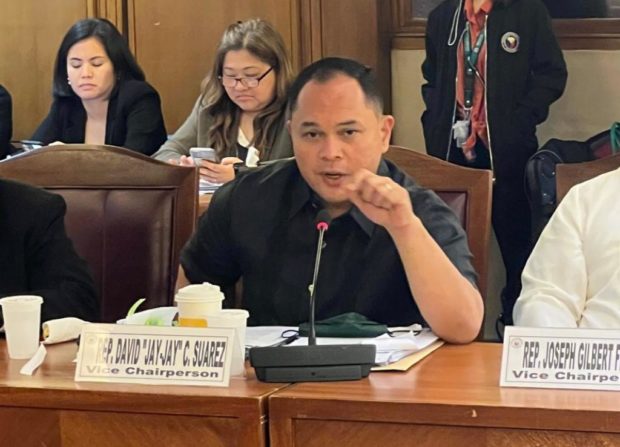Quezon solon grills DBM chief for slow implementation of projects

Rep. Jayjay C. Suarez of Quezon province during one of the House proceedings. FILE PHOTO
MANILA, Philippines — The executive branch has been called out for allegedly being slow in the implementation of different projects, as while 44.6 percent of the funds in the 2023 national budget has been disbursed as of March 31, only 32 percent has been obligated.
During the House Committee on appropriations’ deliberation of the proposed 2024 national budget on Thursday, Quezon 2nd District Rep. Jay-jay Suarez asked Budget Secretary Amenah Pangandaman about the progress of projects funded by the 2023 General Appropriations Act (GAA).
After Pangandaman said that the obligation rate of national government agencies is at 30.5 percent, Suarez said he noticed that there are projects that have not been implemented with less than five months to go in the year.
“Because what we’re noticing madam chair in my district for example is ‘yong mga nasa (those in the) GAA for 2023, marami sa mga projects ay hindi pa rin nai-implement hanggang ngayon (many of the projects have not been implemented until now),” Suarez said.
“So mukhang ‘yong utilization expenditure program natin may problema tayo. Kaya gusto ko po malaman kung paano niyo po nababantayan ‘yong performance ng mga departments and agencies when it comes to utilization of funds that you provide to them,” he added.
(So it appears that our utilization expenditure program has a problem. That’s why I want to know how you are able to monitor the performance of departments and agencies when it comes to utilization of funds that you provide to them.)
According to the Commission on Audit (COA), disbursements are the actual amount spent or paid out — meaning, the funds transferred to the government agencies. Obligations, COA said, indicate that the government is binded to the payment of a sum of money, particularly to contracts with suppliers or contractors for government projects.
Suarez also commented that there are projects that cannot be implemented properly during the second half of the year, because rains and strong cyclones usually affect the country during the latter months.
“One problem we have Sec and Madam chair is we have to deal with weather. So when we talk about agriculture, there are only certain months that you can utilize the projects for agriculture,” he said.
“When you talk about infrastructure, there are only certain months that you can actually start building and constructing especially in provinces like mine in Quezon na wet and dry po talaga, may panahon po talaga ng implementation (it’s really went and dry, there is a perfect time for implementation),” he added.
In response, Pangandaman said that they have released a circular asking agencies to provide their catch-up plans regarding the implementation of projects. The Department of Budget and Management (DBM) head also said that in the proposed 2024 budget, funds allocated to local government units (LGUs) can be considered valid until it is fully spent.
“That’s why po we released a circular letter po for the agencies to provide catch-up plans to facilitate budget execution for the rest of the fiscal years. We ask them to submit their catch-up plans by September 15, 2023,” Pangandaman said.
“Sir if we’re talking about LGUs po, we understand their conditions, that’s why po in 2024 may general provision po tayo, ‘yong budget po nila basta naibigay na po sa kanila, shall be valid until fully expended […] For national government po, meron po silang two years to obligate their budget, ‘pag hindi po nila na-obligate of course we consider that when we prepare their next year’s budget,” she added.
(Sir if we’re talking about LGUs, we understand their conditions, that’s why in 2024 we have general provisions stating that the budget allocated to them shall be valid until fully expended […] For the national government, they have two years to obligate their budget, and if they fail to obligate of course we will consider that when we prepare their next year’s budget.)
Still, Suarez hoped that spending would be expedited as it would be a good driver of economic progress.
“The reason I stressed this point Madam chair is of course ‘yong impact ng government spending sa ekonomiya ng ating bansa. So kung mapapaganda po natin ‘yong pag gastos at mapapabilis po natin ‘yong gastos siguro sa gano’ng paraan mapapaigi rin po natin ‘yong ekonomiya ng ating bansa,” he noted.
(The reason I stressed this point Madam chair is of course the impact of government spending one the country’s economy. So if we can improve the utilization of the budget, expedite spending, maybe we can help the economy progress further.)
Pangandaman faced lawmakers after the House panel started proposed budget discussions with the Development Budget Coordination Committee, which also includes the Bangko Sentral ng Pilipinas, the Department of Finance, and the National Economic and Development Authority.
RELATED STORIES:
House begins hearings on proposed P5.7 trillion national budget for 2024
House receives proposed P5.768-T nat’l budget for 2024 from DBM